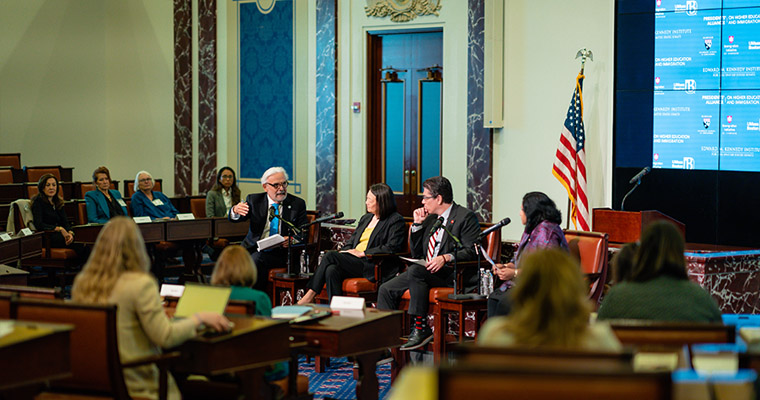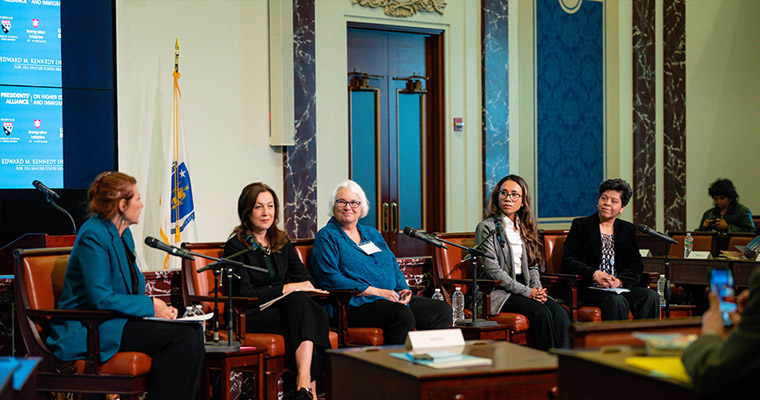- Home
- News
- Recent News
- Chancellor Suárez-Orozco Leads Panel Taking on Imm
Chancellor Suárez-Orozco Leads Panel Taking on Immigration Issues in Higher Education
More Than 800 Leaders Gather to Discuss Matters Facing American Immigrants

“ What do we need to do to address this geological change unfolding on every campus in our country? ”
Chancellor Marcelo Suárez-Orozco moderated the lead panel discussion during an April 21 event at the Edward M. Kennedy Institute for the U.S. Senate that included a series of panels entitled Higher Education Pathways to Immigration: Why It Matters. Chancellor Suárez-Orozco kicked off the morning-long event with An American Story: Higher Ed and Immigration, a panel composed of immigrant higher ed leaders.
The event, exploring the challenges and promise of immigration in higher education, drew in-person and virtually more than 800 higher ed leaders, immigration experts, government officials, and others. It was led by the national Presidents’ Alliance on Higher Education & Immigration and cosponsored by the Immigrant Initiative at Harvard and UMass Boston.
Speakers and panelists highlighted how higher education can help more immigrants integrate into and contribute to local communities as well as to the broader national dynamism and prosperity. Presenters also detailed how there are both obstacles that stymie the potential of DACAmented, undocumented, international, and refugee students and their longer-term stability and careers in the U.S., as well as opportunities to facilitate new higher ed pathways to help more immigrants integrate into and contribute to our communities.
Presidents’ Alliance Executive Director Miriam Feldblum laid out the challenge as she opened the event in the Senate Chamber replica in the Kennedy Institute.
“How are we in higher education partnering with government officials, … with business, labor, immigration advocates and more to advance … forward-looking policy goals?” she asked. “How can we intentionally and strategically embrace our role as an immigration pathway.”
Suárez-Orozco shared his story of immigrating to the United States at age 17 and enrolling in the California Community College system to start on a path toward leadership in higher education. Panel members included incoming UMass Amherst Chancellor Javier Reyes, who immigrated from Mexico; Bunker Hill Community College President Pam Eddinger, who immigrated from Hong Kong; and World Education Services CEO Esther Benjamin, from Sri Lanka.
“My journey, your journeys, is informed by the duality of possibilities education and immigration,” Suárez-Orozco began, asking panelists to share their perspectives. “Thirty-one percent of all students enrolled in higher education are immigrant-origin; 88 percent of Asian students are immigrant-origin; 68 percent of Latino students are immigrant-origin; 28 percent of Black students are immigrant-origin; 10 percent of white students are immigrant-origin.
“What do we need to do to address this geological change unfolding on every campus in our country? How can we do better?” he asked.
The challenges outlined by the panelists included visa policies that often discourage rather than encourage students toward college completion and career opportunities in the U.S. and a country that, while made up of immigrants, is sometimes ambivalent or even hostile to present-day immigrants.
“I think that the words that have emerged on campuses is how do you create that sense of belonging, create that sense of being welcome,” said Reyes, currently the interim chancellor at the University of Illinois Chicago. “This is a cultural experience that you can create on campus if we embrace it and really, really create that sense of collaboration, exploration…. [You] can create a completely different perspective of how this country can emerge, move forward in the next two to three decades.”
“I think we need to be intentional and mindful of the language we us in assisting immigrant students. We need to stop using the language of rescue. Immigrants don’t need rescuing,” said Eddinger. “We need to think of language that’s not deficit, but assets.
“Being an immigrant myself and having gone through that journey, there is a big difference between comfortable in a space and feeling belonging in a space,” she continued. “Where I feel belonging is when folks understand that there’s value in every culture and it is being integrated into the American society at large.”

The half-day event also included a panel entitled Overcoming Barriers to Citizenship and Immigrant Inclusion, moderated by Dr. Carola Suárez-Orozco, director of the Harvard Immigration Initiative and Professor in Residence at Harvard Graduate School of Education. Panel members included Eva Millona, Chief Office of Citizenship, Partnership, and Engagement at U.S. Citizenship and Immigration Services; Nancy Ramírez Palencia, graduate student at Harvard Graduate School of Education; Patricia Sobalvarro, executive director of Agencia ALPHA; and Mary Waters, PVK Professor of Arts and Sciences and John L. Loeb Professor of Sociology at Harvard University.
The morning panels were followed by a lunch-time discussion entitled Opening Door to Global Talent: A Conversation with Immigrant Entrepreneurs, moderated by Rajika Bhandari, senior advisor at the Presidents’ Alliance on Higher Education & Immigration. The conversation included Lydiah Kemunto Bosire, founder and CEO or 8B Education Investments, and Sasha Ramani, Director of Corporate Strategy at MPOWER Financing.
Key findings and video recording of the event can be viewed on the Presidents’ Alliance website.
